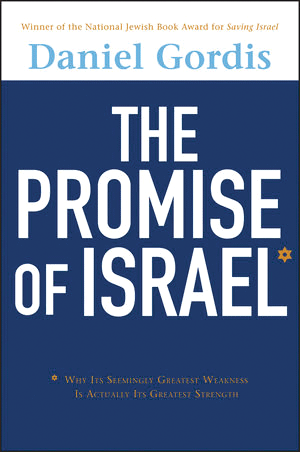Reviewed by NEAL GENDLER
Rebirth of Israel has revived the Jewish people and filled us with a confidence lacking for centuries.
But Israel finds itself increasingly reviled in much of the Western world — at least by intellectuals — because it is countercultural. In a time when Westerners are smitten with universalism, Israel dares to be particularist, a state recreated in one place for one people.
The Promise of Israel is Daniel Gordis’ clearly written, insightful explanation for the increasing enmity toward Israel, one beyond the usual perception of Arabs as underdogs, “the occupation,” Arab refugees and plain old Jew hatred repackaged as anti-Zionism.
Israel defies the West’s prevailing view that “eradicating differentness is the best path toward human flourishing,” says Gordis, a scholar, writer and senior vice president and Koret Distinguished Fellow at the Shalem Center in Jerusalem. “The idea of a state for a particular ethnicity strikes many people as problematic, immoral and contrary to the progress that humanity has made in recent decades.”
Jews, he says, have to fight this notion if we’re to continue to exist as a people.

“Israel was founded to move the Jews to precisely the condition that the Western world was trying to avoid,” Gordis says. Given intellectuals’ disparagement of ethnic nation-states, “one might well expect that Israel would be a backward, intolerant state. In fact, in numerous measurable ways, Israel is more open than every other similar state.”
Gordis says the purpose of his book is “to articulate why Israel’s survival matters not only to the Jews but also to freedom-loving human beings everywhere.”
Although Israel has many shortcomings, it should be seen as a model of a nation for one ethnic group that leads in extending equal rights, he says. Members of parliament include women, Arabs and the openly gay, and “its national government has more democratically elected Muslim officials than all the other non-Muslim states combined — more, even, than the United States.”
Yet Israel has become the target for universalist intellectuals’ resentment that nationalism has refused to die. Although “Israel is far from the only country to put religion or ethnicity at the core of its self-definition,” only Israel inspires debate about whether it has a right to exist.
“Zionism was not a matter of mere refuge: It was a matter of breathing new life into the Jewish people,” of recovering “who we are,” Gordis says. “The Jewish state rightly resists the demand that it become just like all the other states that are not based on a particular ethnic identity,” he says. Thus, Israel is “locked in conflict with much of the West.”
He says the Bible’s Tower of Babel story makes ethnic division the ideal while the New Testament’s idea is the opposite.
But it is natural to feel closer to some people than to others, and “without instinctive loyalty to our own group… we cannot stand for ourselves, for anyone else, or for anything at all.” Further, he says, “without the option of being distinct, there can be no meaningful freedom.”
Giving up distinctiveness, distancing from an ethnic heritage, often is the cost of “making it” for minorities in an America that still visualizes itself as basically white and Protestant, Gordis says. American Jews live in a country in which their culture is not the norm.
“Israel is not simply a Hebrew-speaking version of the United States,” says Gordis, a Conservative rabbi who moved to Israel with his family from California. “Israel has given Jews what they have never been able to have anywhere else… a chance to live a robust Jewish life on their ancestral land.”
Israel has changed “the existential condition of Jews everywhere, even in the United States,” he says. American Jews need to realize that the Jewish life we take for granted “is actually a product of the existence of a Jewish state” and wouldn’t exist without it. We must continue to be its advocate because “the stakes could not be higher… not just the Jewish state but the Jewish people as we know it.”
***
Neal Gendler is a Minneapolis writer and editor.
(American Jewish World, 9.28.12)



















